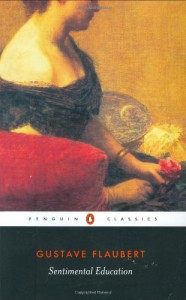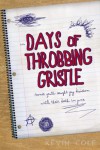Currently reading
Days of Throbbing Gristle
The Colonel
Adieux: A Farewell to Sartre
A Room of One's Own
Les Misérables
Sentimental Education
 Sentimental Education: As the title suggests it can be read as an educational novel. How many times have you read a book about sentimentality? Me, none. Perhaps there are many self help books out there, about love, relationships, or many other things, but I never saw a psychological book just about sentimentality.
Sentimental Education: As the title suggests it can be read as an educational novel. How many times have you read a book about sentimentality? Me, none. Perhaps there are many self help books out there, about love, relationships, or many other things, but I never saw a psychological book just about sentimentality. Frédéric, an 18 years old man, from a small city comes to Paris to continue his education in law. From the very first pages of the novel, from the very first moments of his trip to Paris, in the ship, he meets a woman, a married woman, several years older than him, who every little motion of her, seduces him.
At first sight, it probably seems to be easy to contact with someone that you think you love him/her. But as the matter of fact, there is nothing in the world as difficult as to make someone to respond to your feelings in the way that you expect. And Frédéric understands it very well:
What bliss it would have been to ascend side by side with her, his arm around her waist, while her gown would sweep the yellow leaves, listening to her voice and gazing into her eyes! The steamboat might stop, and all they would have to do was to step out of it; and yet this thing, simple as it might be, was no less difficult than it would have been to move the sun.
He tries his best to find her in Paris; to be as near as possible to her. Makes friends with her husband's friends and her husband and finally he is invited to their weekend parties. He sees her…
He's now flying in his dreams; in his illusions or delusions. Life is worth living as long as he can see her at weekend parties. This is an imaginary picture that seduces him, makes him lose his money ,sometimes, his opportunities or friends. You will say: This man lost his head!
What is the mystery of passion?! With whom do we fall into illusions more? Unfortunately, I don't think anybody could yet find an accurate function for that. But probably one of the most governing variables would be "inaccessibility". The more a loved is inaccessible the more the passions are. Madame Arnoux a married woman that needs very much effort by someone like Frédéric a naive, provincial and not that very bourgeois man to possess her thoroughly for himself. Perhaps Frédéric himself can be the representation of the men of his generation:
I want to write the moral history of the men of my generation-- or, more accurately, the history of their feelings. It's a book about love, about passion; but passion such as can exist nowadays--that is to say, inactive.
Perhaps, Frédéric is not likeable; for someone who reads it beyond the lens of rationality. Frédéric like Emma Bovary is sinking in Romanticism. Perhaps it's time to read more about the roots of Romanticism in life. Why we fall in love, why love blinds people and why some people, like Frédéric, live whole their life with only one special picture of love in their own mind?!
In contrast to Frédéric, the main character, that would not be correct to call him a "hero", there are many other characters with different ideologies. Rational men who break their lover's heart for the sake of revolution. Or Sénécal who says art should be only for educating the masses:
No, monsieur, you have no right to excite my interest in matters of which I disapprove. What need have we of laborious trifles, from which it is impossible to derive any benefit—those Venuses, for instance, with all your landscapes? I see there no instruction for the people! Show us rather their miseries! arouse enthusiasm in us for their sacrifices! Ah, my God! there is no lack of subjects—the farm, the workshop.
Or Pellerin, an artist, who prefers the beauty of tigers instead of women and that what fascinates you is just the very thing that degrades her as an idea; I mean her breasts, her hair. Compare it with Frédéric's answer: "Nevertheless, long black hair and large dark eyes…"
Beside the love stories of Frédéric, the historical aspect in this novel is very strong. It is indeed the story of revolution of 1848 in France. Although I don't know much about Flaubert's personality and political view points, I think in this novel he is impartial; he doesn't look like a Democrat, Conservative or Socialist. Characters during the novel change their ideas, whoever who was once somebody's friend will be his enemy finally.
One of the main critiques of Sentimental Education in its time was that it lacked the sense of Ideal and even some critics considered it as a work of an idiot! In response, Flaubert wrote to one of his friends (Maxime Du Camp) that the ideal was not at issue, but the truth that the years since 1848 were ones of "unending lies," "false politics," "false literature," "false credit," and even "false courtesans." This was a time, he insisted, of which it was impossible to write a "jolie histoire."[1]
I don't want to go into so many spoilers, but there were some parts that I laughed out loud (I very much like Flaubert's sense of humor), felt sympathy for Frédéric, or some parts that made me compare myself with Frédéric. And there's, I think something profound in the last two pages, in one of 47-Fredric's memory of his adolescence…
I could not find any new film adoption for this novel. Sometimes when I'm reading a novel, I imagine the main character a famous actor or actress. Here for Frédéric, a great lover, Leonardo DiCaprio might be the first choice, as the actor of Jack in Titanic or much better The Great Gatsby! But actually I couldn't think of him, unless for one part where Frédéric loses his control and gets angry… (that I think DiCaprio is perfect in such situations), instead, I was thinking of Tobey Maguire, Gatsby's friend, as Frédéric. I think he's perfect for such performance (sensitive and fallible):

Finally, whoever who says Madam Bovary is Gustave Flaubert's best work, he/she hasn't read Sentimental Education yet!
[1] http://www.ohio.edu/chastain/rz/sentimen.htm







